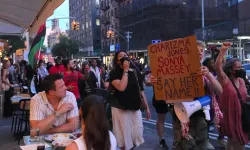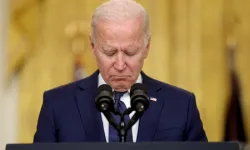French Foreign Minister Stephane Sejourne and his Irish counterpart Michael Martin said that the European Union (EU) should sanction Jewish settlers who commit acts of violence against Palestinians in the West Bank and East Jerusalem.
French Foreign Minister Sejourne told the press on the sidelines of a meeting of EU Foreign Ministers to discuss the two-state solution in the Middle East that he hoped the EU would act within days to sanction illegal Jewish settlers who commit acts of violence against Palestinians in the occupied West Bank.
Sejourne said Israeli Prime Minister Binyamin Netanyahu's statement opposing the "two-state solution" was "disturbing" and emphasized the need for the establishment of a Palestinian state, which means "security guarantees" for all.
Ireland to insist on sanctions against Jewish settlers
Irish Deputy Prime Minister, Minister of Foreign Affairs and Defense Martin also stated that the negotiations on the imposition of sanctions against illegal Jewish settlers are continuing and noted that 2 countries in the EU oppose the sanctions in question without naming them.
Emphasizing that his country's stance on imposing sanctions on Jewish settlers is clear, Martin said, "There is an agreement on sanctions against Hamas and this is the right decision. But in the same way, an agreement must be reached on sanctions against violent settlers in the West Bank. We are very clear on this and we will insist on it today."
Martin said Netanyahu's rejection of a "two-state solution" is "unacceptable" and does not contribute to peace in the region.
Underlining the importance of a "two-state solution" for both Israeli and Palestinian citizens to live in security and peace, Martin called on Netanyahu to listen to the majority of peace advocates around the world.
Ireland considers intervening in "genocide" trial
In a statement to Irish public broadcaster RTE, Martin announced that his country is considering intervening in South Africa's case at the International Court of Justice (ICJ) accusing Israel of committing "genocide" in Gaza.
Stating that no country, including Palestine, has yet officially intervened in the case filed by South Africa, Martin pointed out that the ICJ will first decide on South Africa's requests for precautionary measures such as the immediate cessation of attacks on Gaza and the unhindered entry of humanitarian aid.
Martin recalled that his country spent 12 weeks at the ICJ considering legal arguments before intervening in the case against Russia for its attacks on Ukraine and said that the same would apply to the case against Israel and that they would have to analyze South Africa's arguments in detail before taking any steps to intervene.
South Africa's genocide case against Israel at the ICJ
On December 29, 2023, the Republic of South Africa filed a lawsuit against Israel at the ICJ on the grounds that Israel's attacks on Gaza violate the Genocide Convention and requested an injunction against Israel.
In this context, South Africa asked the ICJ to grant 9 interim injunctions.
These include "that Israel immediately cease its military operations in Gaza, take all reasonable measures to prevent the genocide of Palestinians, ensure that the displaced return to their homes and have access to humanitarian assistance, including adequate food, water, fuel, medical and hygiene supplies, shelter and clothing, take the necessary steps to punish those involved in the genocide and preserve the evidence of genocide".
South Africa requested the ICJ to issue an injunction due to the urgency of the situation, and after the completion of the hearings on January 11-12, the Court began deliberations on the decision, examining the parties' submissions and evidence.
There is no deadline for the judges to announce a decision, but previous ICJ proceedings suggest that in urgent cases such as genocide, this could take several weeks.













